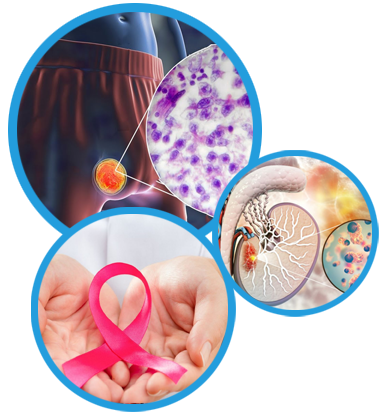
Testicular Cancer
Testicular cancer is a relatively rare type of cancer that develops in the testicles, the male reproductive glands responsible for producing sperm and testosterone.
It typically affects younger men, with the highest incidence occurring in those between the ages of 15 and 35.
Testicular cancer is highly treatable, especially when detected early, and has a high cure rate.
It typically affects younger men, with the highest incidence occurring in those between the ages of 15 and 35.
Testicular cancer is highly treatable, especially when detected early, and has a high cure rate.
Symptoms
Symptoms of testicular cancer may include
- A lump or swelling in one or both testicles
- Pain or discomfort in the testicles or scrotum
- Heaviness or aching in the lower abdomen or groin
- Enlargement of the testicle
- Changes in the size, shape, or consistency of the testicle
- Fluid buildup in the scrotum
- Back pain, chest pain, or difficulty breathing if the cancer has spread to other parts of the body
Causes
– The exact cause of testicular cancer is often unknown, but certain risk factors may increase the likelihood of developing the disease.
– Risk factors for testicular cancer include undescended testicles (cryptorchidism), family history of testicular cancer, personal history of testicular cancer, and certain genetic conditions such as Klinefelter syndrome.
– There is some evidence to suggest that environmental factors, such as exposure to certain chemicals or toxins, may also play a role in the development of testicular cancer.
– Risk factors for testicular cancer include undescended testicles (cryptorchidism), family history of testicular cancer, personal history of testicular cancer, and certain genetic conditions such as Klinefelter syndrome.
– There is some evidence to suggest that environmental factors, such as exposure to certain chemicals or toxins, may also play a role in the development of testicular cancer.
Diagnosis
– Diagnosis of testicular cancer typically involves a combination of medical history, physical examination, and diagnostic tests.
– Common diagnostic tests for testicular cancer include a scrotal ultrasound to visualize the testicles and any abnormalities, blood tests to measure tumor markers such as alpha-fetoprotein (AFP), beta-human chorionic gonadotropin (beta-hCG), and lactate dehydrogenase (LDH), and a biopsy to obtain a tissue sample for examination under a microscope to confirm the presence of cancerous cells.
– Imaging tests such as CT scan, MRI, or PET scan may also be performed to determine the extent of the cancer and whether it has spread to other parts of the body.
– Common diagnostic tests for testicular cancer include a scrotal ultrasound to visualize the testicles and any abnormalities, blood tests to measure tumor markers such as alpha-fetoprotein (AFP), beta-human chorionic gonadotropin (beta-hCG), and lactate dehydrogenase (LDH), and a biopsy to obtain a tissue sample for examination under a microscope to confirm the presence of cancerous cells.
– Imaging tests such as CT scan, MRI, or PET scan may also be performed to determine the extent of the cancer and whether it has spread to other parts of the body.
Conclusion
– Testicular cancer is a highly treatable form of cancer with a high cure rate, especially when detected early.
– Treatment options for testicular cancer may include surgery to remove the affected testicle (orchiectomy), chemotherapy, radiation therapy, or a combination of these approaches.
– The prognosis for testicular cancer is generally excellent, with a five-year survival rate exceeding 95% for most cases.
– Early detection and intervention are crucial for successful treatment and improved outcomes.
– Support from healthcare providers, family, and friends can play a crucial role in navigating the challenges associated with a diagnosis of testicular cancer.
– Treatment options for testicular cancer may include surgery to remove the affected testicle (orchiectomy), chemotherapy, radiation therapy, or a combination of these approaches.
– The prognosis for testicular cancer is generally excellent, with a five-year survival rate exceeding 95% for most cases.
– Early detection and intervention are crucial for successful treatment and improved outcomes.
– Support from healthcare providers, family, and friends can play a crucial role in navigating the challenges associated with a diagnosis of testicular cancer.
Satisfied Patients
0
K+
Surgeries Performed
0
+
Years of Experience
0
+
Current News & Event
Free Health camp
Lions Club Bhagalpur Gold invites you to a free health camp in which the focus will be on urological problems.
This camp will take place this Sunday, April 14, 2024 from 9 am to 1 pm.
This camp will take place this Sunday, April 14, 2024 from 9 am to 1 pm.

KIDNEY STONE, URINARY BLADDER STONE, URINARY TRACT INFECTION, LOW TESTOSTERONE, PROSTATE CANCER, KIDNEY CANCER, RENAL CYST.
KIDNEY STONE, URINARY BLADDER STONE, URINARY TRACT INFECTION, LOW TESTOSTERONE, PROSTATE CANCER, KIDNEY CANCER, RENAL CYST.





